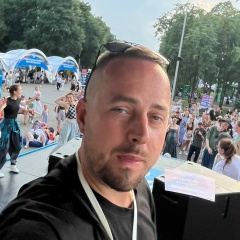Как поссорились Мария Александровна и Владимир Ильич.
В эти дни исполняется 100 лет событиям вошедшим в историю как мятеж левых эсеров - насильственной попытке повлиять на политику правительства большевиков их главными союзниками в октябре 1917 года, а после заключения мира с Германией и легальными оппозиционерами курсу Совнаркома. В эти дни рухнула сама идея многопартийной системы в Советской России. После июля 1918 года у власти была только одна партия.
Но мне интереснее написать здесь не о самих драматичных событиях, а об их интерпретации на экране. О полузабытом ныне фильме, который все-таки, на мой взгляд заслуживает, чтобы его помнили и пересматривали - "Шестое июля" 1968 года. В 60-ые на волне Оттепели в СССР был снят целый ряд фильмов, старавшихся отойти от трактовок эпохи Сталина и по-новому, и сценарно и художественно, посмотреть на Ленина и эпоху Гражданской войны. "На одной планете", "Штрихи к портрету", "Ленин в Польше" и "Шестое июля". Они конечно же были идеалогизированы и идеализировали Ленина и большевиков, но заряд художественной силы и яркости был в них такой силы, что их стоит пересмотреть и сейчас, даже если вы не отождествляете себя ни с большевиками, ни с коммунистами.
Эстетика "Шестого июля" стилизована под хронику эпохи, игра света и теней, интертитры, особый акцент на речи ораторов. Создатели как бы возвращаются к канонам 20-ых годов, чтобы подчеркнуть документальность фильма. И мне лично это очень понравилось. Эстетика эта даже на фоне фильмов-современников выделялась, не то что сейчас. Отточенные операторские ракурсы, четкость и контрастность.
Фильм фактически реабилитировал партию левых эсеров. Мелкобуржуазные враги большевиков показаны здесь с очень человеческим лицом. Им, жестоким, но страстным идеалистам, в этом фильме наверное невольно сопереживаешь даже больше, чем правильным рациональным большевикам. Да, ошибаются, да выбрали не те методы, пошли на опасную самоубийственную авантюру, но какая искренность была в них! Безусловно, огромную роль здесь играет Алла Демидова - это "ее" фильм и звездный час. Ее Мария Спиридонова жесткая и страстная, идеалистичная и непримиримая, внешне подмороженная всей прошлой своей жизнью. В ней отчетливо видно это прошлое- подполье 1905 года, насилие времен революции, каторга. Натура, "любящая террор и это взаимно". Другие эсеры тоже не показаны трафаретными злодеями. Даже Яков Блюмкин, убивший германского посла Мирбаха и расстрелянный уже в годы Сталина. Хотя Шалевич, исполнивший этакого "Бонда из ВЧК" мало напоминает того 18-летнего парня, который поехал в германское посольство разжигать огонь мировой революции.
Большевики конечно же мудры и рациональны. Но и на них смотреть интересно. Это удивительный фильм - в нем есть Троцкий, но и нет Троцкого. Ленин общается по телефону с Наркомвоеном, но конечно же в фильме не говорится о его фамилии. Ленин здесь показан как уставший и растерянный человек. Власть висит на волоске, мятежи по всей стране, обесточенный Кремль обстреливают из артиллерии. Разрывающая шаблон сцена - Ленин достает из ящика стола пистолет и перекладывает в карман пиджака. Конечно к лету 1918 года союз между левыми эсерами и большевиками был почти исчерпан, жесткий конфликт назревал, взаимные обвинения были яростными - в фильме показано все мягче. Сценаристы деликатно убрали эмоциональные фразы Дзержинского о том, что он всех тут расстреляет, когда собственные чекисты брали его под арест.
Стоит сказать, что не смотря на все "причесывания" и "правильные" акценты картина в целом точно передает хронику мятежа и все ключевые события.
Фильм фактически о крушении идеи "левого блока" в 18 году, о невозможности ужиться большевикам с другими социалистами. Радикалы против радикалов. Заступники крестьянства против создателей комбедов. Власть переходила в одни руки и неминуемо все шло к террору для сохранения этой самой власти. И надо помнить, что если бы в эти дни левые эсеры победили, то их идеалистичные мечты привели бы к новой войне с Германией, лютой партизанщине, оккупации и казням. С учетом остальных участников Гражданской.
В эти дни исполняется 100 лет событиям вошедшим в историю как мятеж левых эсеров - насильственной попытке повлиять на политику правительства большевиков их главными союзниками в октябре 1917 года, а после заключения мира с Германией и легальными оппозиционерами курсу Совнаркома. В эти дни рухнула сама идея многопартийной системы в Советской России. После июля 1918 года у власти была только одна партия.
Но мне интереснее написать здесь не о самих драматичных событиях, а об их интерпретации на экране. О полузабытом ныне фильме, который все-таки, на мой взгляд заслуживает, чтобы его помнили и пересматривали - "Шестое июля" 1968 года. В 60-ые на волне Оттепели в СССР был снят целый ряд фильмов, старавшихся отойти от трактовок эпохи Сталина и по-новому, и сценарно и художественно, посмотреть на Ленина и эпоху Гражданской войны. "На одной планете", "Штрихи к портрету", "Ленин в Польше" и "Шестое июля". Они конечно же были идеалогизированы и идеализировали Ленина и большевиков, но заряд художественной силы и яркости был в них такой силы, что их стоит пересмотреть и сейчас, даже если вы не отождествляете себя ни с большевиками, ни с коммунистами.
Эстетика "Шестого июля" стилизована под хронику эпохи, игра света и теней, интертитры, особый акцент на речи ораторов. Создатели как бы возвращаются к канонам 20-ых годов, чтобы подчеркнуть документальность фильма. И мне лично это очень понравилось. Эстетика эта даже на фоне фильмов-современников выделялась, не то что сейчас. Отточенные операторские ракурсы, четкость и контрастность.
Фильм фактически реабилитировал партию левых эсеров. Мелкобуржуазные враги большевиков показаны здесь с очень человеческим лицом. Им, жестоким, но страстным идеалистам, в этом фильме наверное невольно сопереживаешь даже больше, чем правильным рациональным большевикам. Да, ошибаются, да выбрали не те методы, пошли на опасную самоубийственную авантюру, но какая искренность была в них! Безусловно, огромную роль здесь играет Алла Демидова - это "ее" фильм и звездный час. Ее Мария Спиридонова жесткая и страстная, идеалистичная и непримиримая, внешне подмороженная всей прошлой своей жизнью. В ней отчетливо видно это прошлое- подполье 1905 года, насилие времен революции, каторга. Натура, "любящая террор и это взаимно". Другие эсеры тоже не показаны трафаретными злодеями. Даже Яков Блюмкин, убивший германского посла Мирбаха и расстрелянный уже в годы Сталина. Хотя Шалевич, исполнивший этакого "Бонда из ВЧК" мало напоминает того 18-летнего парня, который поехал в германское посольство разжигать огонь мировой революции.
Большевики конечно же мудры и рациональны. Но и на них смотреть интересно. Это удивительный фильм - в нем есть Троцкий, но и нет Троцкого. Ленин общается по телефону с Наркомвоеном, но конечно же в фильме не говорится о его фамилии. Ленин здесь показан как уставший и растерянный человек. Власть висит на волоске, мятежи по всей стране, обесточенный Кремль обстреливают из артиллерии. Разрывающая шаблон сцена - Ленин достает из ящика стола пистолет и перекладывает в карман пиджака. Конечно к лету 1918 года союз между левыми эсерами и большевиками был почти исчерпан, жесткий конфликт назревал, взаимные обвинения были яростными - в фильме показано все мягче. Сценаристы деликатно убрали эмоциональные фразы Дзержинского о том, что он всех тут расстреляет, когда собственные чекисты брали его под арест.
Стоит сказать, что не смотря на все "причесывания" и "правильные" акценты картина в целом точно передает хронику мятежа и все ключевые события.
Фильм фактически о крушении идеи "левого блока" в 18 году, о невозможности ужиться большевикам с другими социалистами. Радикалы против радикалов. Заступники крестьянства против создателей комбедов. Власть переходила в одни руки и неминуемо все шло к террору для сохранения этой самой власти. И надо помнить, что если бы в эти дни левые эсеры победили, то их идеалистичные мечты привели бы к новой войне с Германией, лютой партизанщине, оккупации и казням. С учетом остальных участников Гражданской.
How quarreled Maria Alexandrovna and Vladimir Ilyich.
These days marks 100 years of events that went down in history as a revolt of the Left Socialist Revolutionaries - a violent attempt to influence the policy of the Bolshevik government by their main allies in October 1917, and after peace with Germany and legal opposition was concluded, the course of the Council of People's Commissars. These days, the very idea of a multi-party system in Soviet Russia collapsed. After July 1918, there was only one party in power.
But it’s more interesting for me to write here not about the dramatic events themselves, but about their interpretation on the screen. About the now-half-forgotten film, which nevertheless, in my opinion, deserves to be remembered and reviewed - July Sixth, 1968. In the 60s, on the wave of the Thaw in the USSR, a number of films were shot that tried to move away from the interpretations of the Stalin era in a new, scenic and artistic way, to look at Lenin and the era of the Civil War. “On One Planet”, “Strokes to a Portrait”, “Lenin in Poland” and “Sixth of July”. Of course, they were idealized and idealized Lenin and the Bolsheviks, but the charge of artistic power and brightness was so strong in them that they should be reviewed even now, even if you do not identify yourself with either the Bolsheviks or the Communists.
The aesthetics of "The Sixth of July" is stylized as a chronicle of the era, the play of light and shadow, intertitles, and a special emphasis on the speech of speakers. The creators, as it were, return to the canons of the 20s to emphasize the documentary of the film. And I personally really liked it. This aesthetics even stood out against the backdrop of contemporary films, not like now. Refined camera angles, clarity and contrast.
The film actually rehabilitated the Left Socialist Revolutionary Party. The petty-bourgeois enemies of the Bolsheviks are shown here with a very human face. They, cruel, but passionate idealists, in this film probably involuntarily empathize even more than the right rational Bolsheviks. Yes, they are mistaken, but they chose the wrong methods, went on a dangerous suicidal adventure, but what sincerity was in them! Of course, Alla Demidova plays a huge role here - this is her film and high point. Her Maria Spiridonova is tough and passionate, idealistic and implacable, outwardly frostbitten throughout her past life. It clearly shows this past, the underground of 1905, the violence of the time of the revolution, of hard labor. Nature, "loving terror and this is mutual." Other Social Revolutionaries are also not shown as stencil villains. Even Yakov Blyumkin, who killed the German ambassador Mirbach and was shot already during the years of Stalin. Although Shalevich, who performed a sort of “Bond from the Cheka,” does not resemble the 18-year-old guy who went to the German embassy to light the fire of the world revolution.
The Bolsheviks are of course wise and rational. But it’s interesting to look at them. This is an amazing film - there is Trotsky, but not Trotsky. Lenin talks on the phone with the People’s Commissariat of War, but of course the film does not mention his last name. Lenin is shown here as a tired and confused person. Power hangs in the balance, riots across the country, the de-energized Kremlin is fired from artillery. A scene tearing a template - Lenin takes a gun from a desk drawer and puts it in his jacket pocket. Of course, by the summer of 1918, the alliance between the Left Socialist Revolutionaries and the Bolsheviks was almost exhausted, a tough conflict was brewing, mutual accusations were furious - the film showed softer. The scriptwriters delicately removed the emotional phrases of Dzerzhinsky that he would shoot everyone here when his own security officers took him into custody.
It is worth saying that in spite of all the “combing” and “correct” accents, the picture as a whole accurately conveys the chronicle of the rebellion and all key events.
The film is actually about the collapse of the idea of the "left bloc" in the 18th year, about the impossibility of the Bolsheviks to get along with other socialists. Radicals against radicals. Intercessors of the peasantry against the creators of the comedy Power passed into one hands and inevitably everything went to terror in order to maintain this very power. And we must remember that if these days the Left Socialist Revolutionaries won, their idealistic dreams would lead to a new war with Germany, fierce guerrilla warfare, occupation and executions. Given the rest of the Civil.
These days marks 100 years of events that went down in history as a revolt of the Left Socialist Revolutionaries - a violent attempt to influence the policy of the Bolshevik government by their main allies in October 1917, and after peace with Germany and legal opposition was concluded, the course of the Council of People's Commissars. These days, the very idea of a multi-party system in Soviet Russia collapsed. After July 1918, there was only one party in power.
But it’s more interesting for me to write here not about the dramatic events themselves, but about their interpretation on the screen. About the now-half-forgotten film, which nevertheless, in my opinion, deserves to be remembered and reviewed - July Sixth, 1968. In the 60s, on the wave of the Thaw in the USSR, a number of films were shot that tried to move away from the interpretations of the Stalin era in a new, scenic and artistic way, to look at Lenin and the era of the Civil War. “On One Planet”, “Strokes to a Portrait”, “Lenin in Poland” and “Sixth of July”. Of course, they were idealized and idealized Lenin and the Bolsheviks, but the charge of artistic power and brightness was so strong in them that they should be reviewed even now, even if you do not identify yourself with either the Bolsheviks or the Communists.
The aesthetics of "The Sixth of July" is stylized as a chronicle of the era, the play of light and shadow, intertitles, and a special emphasis on the speech of speakers. The creators, as it were, return to the canons of the 20s to emphasize the documentary of the film. And I personally really liked it. This aesthetics even stood out against the backdrop of contemporary films, not like now. Refined camera angles, clarity and contrast.
The film actually rehabilitated the Left Socialist Revolutionary Party. The petty-bourgeois enemies of the Bolsheviks are shown here with a very human face. They, cruel, but passionate idealists, in this film probably involuntarily empathize even more than the right rational Bolsheviks. Yes, they are mistaken, but they chose the wrong methods, went on a dangerous suicidal adventure, but what sincerity was in them! Of course, Alla Demidova plays a huge role here - this is her film and high point. Her Maria Spiridonova is tough and passionate, idealistic and implacable, outwardly frostbitten throughout her past life. It clearly shows this past, the underground of 1905, the violence of the time of the revolution, of hard labor. Nature, "loving terror and this is mutual." Other Social Revolutionaries are also not shown as stencil villains. Even Yakov Blyumkin, who killed the German ambassador Mirbach and was shot already during the years of Stalin. Although Shalevich, who performed a sort of “Bond from the Cheka,” does not resemble the 18-year-old guy who went to the German embassy to light the fire of the world revolution.
The Bolsheviks are of course wise and rational. But it’s interesting to look at them. This is an amazing film - there is Trotsky, but not Trotsky. Lenin talks on the phone with the People’s Commissariat of War, but of course the film does not mention his last name. Lenin is shown here as a tired and confused person. Power hangs in the balance, riots across the country, the de-energized Kremlin is fired from artillery. A scene tearing a template - Lenin takes a gun from a desk drawer and puts it in his jacket pocket. Of course, by the summer of 1918, the alliance between the Left Socialist Revolutionaries and the Bolsheviks was almost exhausted, a tough conflict was brewing, mutual accusations were furious - the film showed softer. The scriptwriters delicately removed the emotional phrases of Dzerzhinsky that he would shoot everyone here when his own security officers took him into custody.
It is worth saying that in spite of all the “combing” and “correct” accents, the picture as a whole accurately conveys the chronicle of the rebellion and all key events.
The film is actually about the collapse of the idea of the "left bloc" in the 18th year, about the impossibility of the Bolsheviks to get along with other socialists. Radicals against radicals. Intercessors of the peasantry against the creators of the comedy Power passed into one hands and inevitably everything went to terror in order to maintain this very power. And we must remember that if these days the Left Socialist Revolutionaries won, their idealistic dreams would lead to a new war with Germany, fierce guerrilla warfare, occupation and executions. Given the rest of the Civil.





У записи 34 лайков,
4 репостов,
1706 просмотров.
4 репостов,
1706 просмотров.
Эту запись оставил(а) на своей стене Константин Макаров





















































